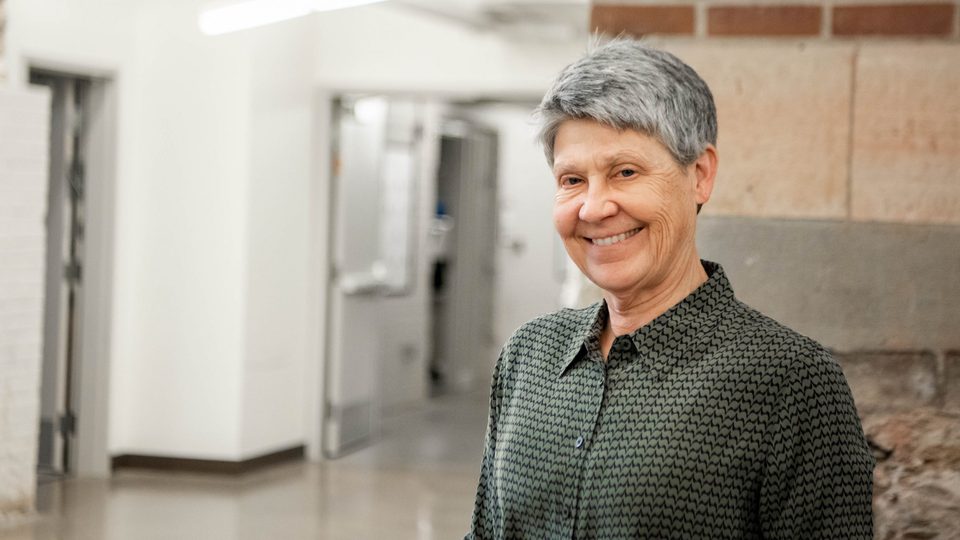Professor Barbara Allen receives award for book exploring lies in political advertising
Book recognizes 11 former students who worked with Allen on election study

Barbara Allen, Carleton’s James Woodward Strong Professor of Political Science and the Liberal Arts, just got a much-deserved publicity boost. On Friday, Nov. 8, Allen was awarded the American Politics Group 2019 Richard E. Neustadt Book Prize in London for her latest book, “Truth in Advertising? Lies in Political Advertising and How They Affect the Electorate,” co-authored with Daniel Stevens.
With the 2020 election approaching, Allen’s book could not be more timely. When I sat down with her, I was impressed to learn that she began research on the topic of political advertising in 2008. Allen’s initial study built off of an already conceived framework that began in 2000 when she put together the Carleton College Election Study to examine election news coverage. Together with Benedict Distinguished Visiting Professor John Sullivan and Stevens, then a graduate student at the University of Minnesota, Allen began leading her students in a comprehensive content analysis of four local news stations. It began with her first-year students who used tape recorders to capture the noon, 5:30 p.m. and 10 p.m. news. Allen would then lug paper bags filled with tapes to the computer lab, where her sophomore and junior students undertook the analysis. In 2004, Professor Greg Marfleet joined in, enlisting students from his Political Research Methods class. At this point in time there was new technology, and students were able to burn news stories onto DVDs—but the study otherwise remained the same.
Then, Allen said, “in 2008, we totally lost our minds.” Not only did the group start studying national and cable news channels along with the local ones, but they began an entirely new analysis of more than 700 political advertisements. This was groundbreaking work; never before had a study analyzed both the sound and imagery of campaign ads, fact-checking them and looking for misleading video edits that distorted the narrative. With so much work to do, student involvement skyrocketed. Jeff Berg ’14 co-wrote a chapter of Allen’s book after spending three summers on the project. Allen also credited research assistants Julia Larson ’13, David Sacks ’11, Kate Johnson ’12, Aaron Cross ’09, Brendan Grant ’12, Kilian Murphy ’11, Alex Tippett ’17 and De’Angelo Williams ’12 in her book. Additionally, she talked about Sarah O’Malley ’08 and Tommy Walker ’08, who did their Comps projects on partial data sets. The latter, Allen said, went on to work for Senator Amy Klobuchar, and many more of the students who worked on the project went on to “really cool political jobs.”
 Just as integral to the research process were Carleton Academic Technologist Paula Lackie and her student DataSquad, including Roy Wiggins ’13, Daniel Alabi ‘14 and Quinn Schiller ’19. Lackie trained these students and more, along with guiding Allen with data directly. According to Lackie, it was “exceptionally labor-intensive work of qualitative analysis,” but it was well worth it. “Without this kind of research,” she said, “we are at the whim of opinion. You can see where that’s gotten us so far.”
Just as integral to the research process were Carleton Academic Technologist Paula Lackie and her student DataSquad, including Roy Wiggins ’13, Daniel Alabi ‘14 and Quinn Schiller ’19. Lackie trained these students and more, along with guiding Allen with data directly. According to Lackie, it was “exceptionally labor-intensive work of qualitative analysis,” but it was well worth it. “Without this kind of research,” she said, “we are at the whim of opinion. You can see where that’s gotten us so far.”
Nothing demonstrates where that’s gotten us better than Allen’s 700 analyzed political ads. From her previous research on election coverage, she had expected to find some mistruths in advertising, mainly the kind that left out parts of a story to blur the lines between fact and fiction. Instead, she said, “there were some things that were so outrageously false that it was shocking.” On average, every advertisement had two deviations from the truth, with more in negative advertisements. Even worse, they found that the lies in these ads could seriously mislead voters, even those who were previously well-informed. The danger, according to Allen, is that “you can’t dislodge the lie” once it has entered your mind.
With such striking findings, it’s no wonder that Allen wanted to write a book about them. She had published her findings in political science journals, but “in a journal article,” she said, “you don’t get to say a lot … about the more fundamental problem.” Passion rose in her voice as she told me that lies in political advertisements are dangerous enough that she thinks the courts should be “protecting political speech that is truthful.” This book is her way of getting that urgent message out there.
And the award? Allen is modest about the benefits it will have for her career, but she’s noticeably glad that it will garner attention about the topic. “It will get the book into libraries,” she said. “I hope it will help spur conversations about ways we can have an effect.” Perhaps someone even more excited about what that effect could be is Lackie, who said, “In an era of anti-intellectualism and anti-science, it’s reassuring that someone is paying attention to evidence-based political writing…Our freedom depends on it.”
Meanwhile, Allen will be back at the study that started it all, this time analyzing political news in the 2016 election cycle. To me, this seems like a particularly daunting task. But if anyone can make sense out of the 2016 election, it’s Barbara Allen.